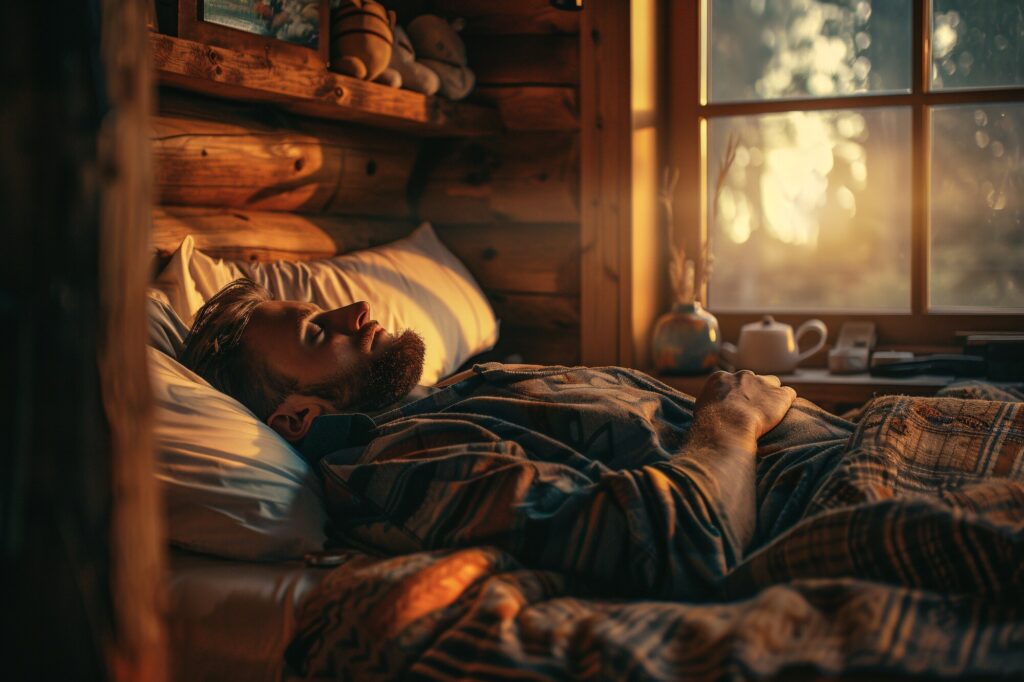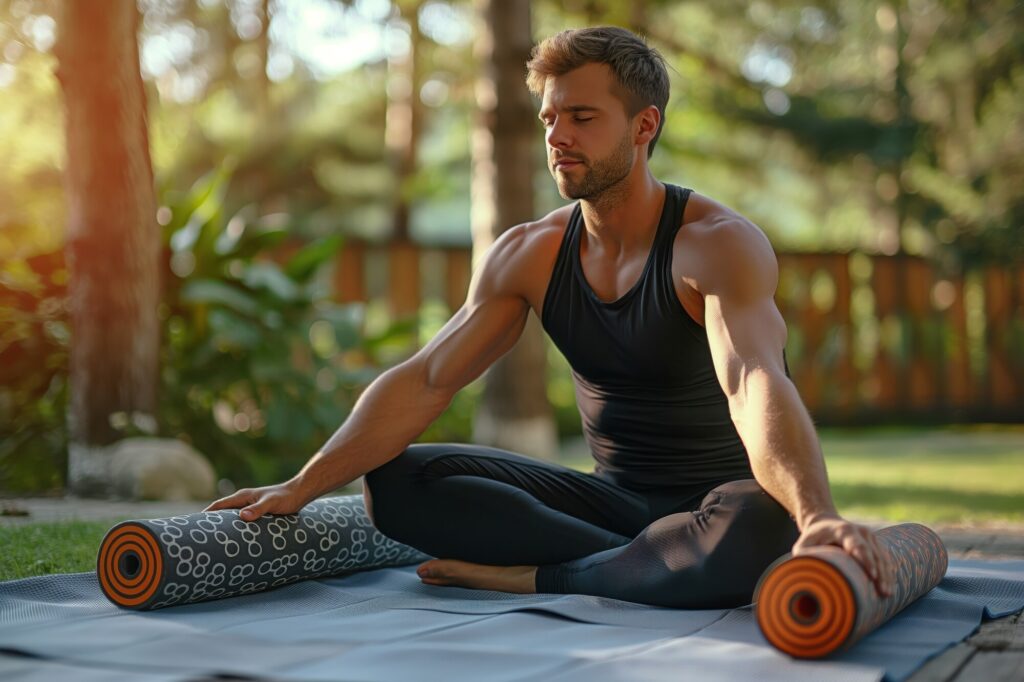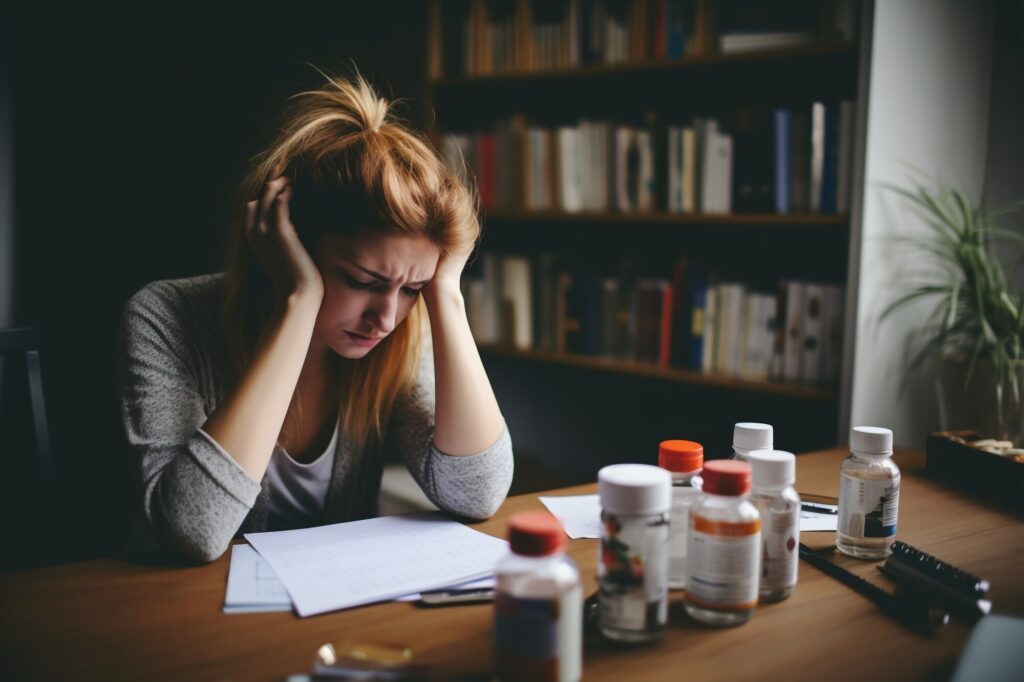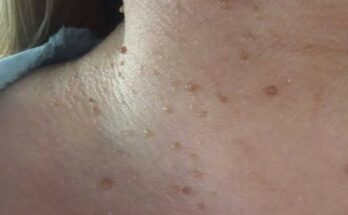When you are falling asleep, you may feel hypnic jerks, also known as sleep beginnings, which are abrupt, involuntary contractions of your muscles.
These jerks happen during the transition from wakefulness to sleep, which is referred to as hypnagogic (short for hypnic).
Hypnic jerks usually only affect one side of the body, like the left arm or leg, and occur seemingly randomly as you fall asleep.
Why Does My Body Twitch at Random Times at Night?
Although the exact cause of hypnic jerks is unknown, there are some ideas. The same area of the brain that regulates your startle response is where hypnic jerks and other forms of myoclonus begin. It is thought that a misfire between nerves in the reticular brainstem occasionally happens while you fall asleep, causing a reflex that results in a hypnic jerk.
For instance, your brain can erroneously believe that you are actually falling when your muscles fully relax, even though this is a typical aspect of falling asleep, and respond by causing your muscles to twitch. Another possibility is that hypnic jerks are a bodily response to the accompanying dreamlike images.

A hypnic jerk may be more likely to occur if you have certain risk factors, such as excessive caffeine and stimulant use, intense activity right before bed, emotional stress, and lack of sleep.
Excessive Caffeine or Nicotine Consumption
Caffeine and nicotine are examples of stimulants that awaken the brain. These drugs can also interfere with sleep by remaining in your system for a number of hours. People in one study still had problems falling asleep even after quitting coffee six hours before bed. Hypnic jerks can result from consuming excessive amounts of caffeine or nicotine or by doing so too soon before bed.
Vigorous Exercise at Night

Exercise generally has a positive impact on sleep practically all the time. It’s crucial to understand, though, that exercise is an energetic activity that increases alertness rather than fatigue. This is why hypnic jerks can result from very intense late-night exercise.
Sleep Deprivation
Sleep deprivation can result from both difficulty falling asleep and an overall lack of regular sleep, whether from persistent insomnia or a bad night’s sleep. Lack of sleep may raise your chance of hypnic jerks, among other undesirable side effects, such as diminished mood and concentration.
Stress and Anxiety
Chronic stress and recognized anxiety disorders can both contribute to insomnia, which causes the type of sleep deprivation that increases your risk of experiencing hypnic jerks. Your cortisol levels stay high while you sleep when you are anxious or stressed, which reduces the quality of your sleep. Additionally, worrying thoughts can keep you awake at night, making it difficult to fall asleep and perhaps causing a hypnic jerk by interfering with the wake-to-sleep transition.
Some people who frequently have hypnic jerks may even get anxious about sleep, which only makes them more likely to suffer from sleep deprivation and have more hypnic jerks. Many people discover that using a weighted blanket while they sleep helps reduce anxiety at night. The thousands of five-star reviews Bearaby has received show how popular they are with both us and many other people due to their durability, vibrant color selection, and bulky knits.
What Do Hypnic Jerks Feel Like?
Myoclonus, a group of quick, involuntary muscle movements like jerking or twitching, includes hypnic jerks. Before your body relaxes once more, you can jerk once or more times in quick succession. A hypnic jerk is frequently accompanied with other feelings or mental imagery, such as a dream or hallucination, in addition to these movements. People frequently report hearing pounding, crackling, or snapping sounds, seeing flashing or blinding lights, or feeling as though they are falling. Although some people report a tingling or unpleasant sensation, hypnic jerks are often painless.
At different moments, hypnic jerks may have distinct sensations. They may be powerful enough to startle someone out of sleep and interfere with their ability to fall asleep. At other times, they could be so subtle that the person who is affected doesn’t even notice them, while their sleep companion might.
Although they can happen to anyone at any age, hypnic jerks are more common in adults. The fact that some of their potential causes—like excessive coffee consumption and high stress levels—are also more prevalent in adulthood may help to explain this.
Are Hypnic Jerks Normal? Should I be Concerned?
Although they can be unnerving, hypnic jerks are not harmful. Hypnic jerks are experienced by up to 70% of people.
Although hypnic jerks can be bothersome and interfere with your partner’s sleep, that is usually the end of their negative consequences. A slight injury could result from a particularly severe jerk, but this is uncommon.
When to See a Doctor About Hypnic Jerks
Unlike other motions that can happen while you’re sleeping or awake, hypnic jerks are distinct. Hypnic jerks happen rapidly during the shift from wakefulness to sleep and are usually regarded as innocent. You probably don’t need to see a doctor if you simply get hypnic.
However, a doctor might need to treat some hypnic jerk-like symptoms. You may be suffering from a different kind of myoclonus than a hypnic jerk if you have several, continuous muscular contractions during the day that radiate to other areas of your body. Myoclonus of these kinds may be a sign of other illnesses. Periodic limb movement disorder may be the cause of any jerking motions you feel while you sleep, other than hypnic jerks. Consult your physician if you think your muscle jerks could be a sign of another problem.
How To Stop Hypnic Jerks
A common, if surprising, aspect of falling asleep is experiencing hypnic jerks. There is little chance that you will be able to get rid of them entirely. With a few easy methods, you may lessen their occurrence and severity while also enhancing your quality of sleep.
Adopt Better Sleep Habits
Hypnic jerks may be less common if you can sleep better and more consistently by practicing improved sleep hygiene. Typical procedures consist of:
- Going to bed and waking up at the same time every day, even on weekends
- Setting your bedroom temperature to around 65 to 68 degrees Fahrenheit
- Making your bedroom as dark and quiet as possible, using blackout curtains or a white noise machine if needed
- Stopping the use of electronics at least one hour before bed
- Following a nightly bedtime routine
Reduce Your Stress
Hypnic jerks may decrease when stress levels decline. Investigate stress-relieving relaxation methods. Yoga, deep breathing, and meditation can all be beneficial. Incorporate relaxing activities into your sleep routine, such as reading a book or taking a warm bath. Consult a physician or therapist if your thoughts and stress are affecting your quality of life.

Exercise Daily
Get more restful sleep by exercising every day. Frequent exercise can also aid in stress reduction. Plan your workout for earlier in the day to avoid interfering with your sleep. Choose low- to moderate-intensity activities like yoga or strolling if you can only work out at night. To avoid hypnic jerks, try to complete your workout at least 90 minutes before bed to give your heart rate time to return to normal.
Minimize Your Caffeine Consumption

While there are some positive energy-boosting effects of caffeine during the day, too much of it, especially later in the day, might disrupt your sleep. Caffeine may be the cause of your hypnic jerks and subsequent difficulty falling asleep. Don’t take more than 400 mg daily, and try to have your last cup of coffee at least eight hours before bed.
Avoid Nicotine and Alcohol
Nicotine is a stimulant that can make it harder for your brain to relax at night. Once you’re asleep, it may also affect the quality of your sleep. Alcohol can alter the structure of your sleep, even if it is a sedative. resulting in the lack of sleep that makes hypnic jerks more likely.
Note that you may still occasionally get hypnic jerks even after following these suggestions. They are thought to be a typical aspect of falling asleep. However, speak with your physician if you have more motions that are interfering with your sleep.



